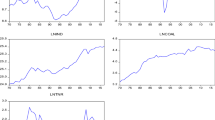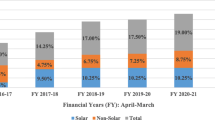Abstract
The European Union Renewable Energy Directive sets an objective of increasing the renewable energy share of the used renewable energy in the EU by 2020. The objective of this study is to analyze and compare the short-run and long-run relationship between renewable energy consumption and economic growth in 12 European Union countries and to derive implications for renewable energy policy. To do so, we apply panel vector error correction model using the available annual data from 1990 to 2014 on 12 European Union countries. Moreover, Granger causality test is conducted to examine whether there exists any causal linkage between economic growth and renewable energy consumption. The findings indicate the presence of unidirectional causality running from economic growth to renewable energy consumption in the short run. However, in the long run, a bidirectional causal relationship between the variables in question exists.
Similar content being viewed by others
References
Al-Mulali U, Fereidouni HG, Lee JY, Sab CNBC (2013) Examining the bi-directional long run relationship between renewable and sustainable energy. Energy Rev 22:209–222
Angelis Dimakis A, Biberacher M, Dominguez J, Fiovese G, Gadocta S, Gnansounou E, Guariso G, Kartalidis A, Panichelli L, Pinedo I, Robba M (2011) Methods and tools to evaluate the availability of renewable energy sources. Renew Sustain Energy Rev 15:1182–1200
Apergis N, Payne JE (2010) A panel study of nuclear energy consumption and economic growth. Energy Econ 32:545–549
Apergis N, Payne JE (2011) A dynamic panel study of economic development and the electricity consumption-growth nexus. Energy Econ 33(5):770–781
Apergis N, Payne JE (2012a) Renewable energy consumption and economic growth: evidence from a panel OECD countries. Energy Policy 38:656–660
Apergis N, Payne JE (2012b) The renewable energy consumption—growth Nexus in central America. Appl Energy 88:343–347
Ayari N, Blazsek S, Mendi P (2012) Renewable energy innovations in Europe: a dynamic panel data approach. Appl Econ 44(24):3135–3147
Balat M (2009) Usage of energy sources and environmental problems. Energy Explor Exploit 23:141–168
Barker T, Dagoumas A (2009) The macroeconomic rebound effect and the world economy. Energ Effi 2:411–427
Belk A, Donik F, Dreger C (2011) Energy consumption and economic growth: new insights into the cointegration relationship. Energy Econ 33:782–789
Canning D, Pedroni P (2008) Infrastructure, long-run economic growth and causality tests for cointegrated panels. Manch Sch 76(5):504–527
Cho S, Heo E, Kim J (2015) Causal relationship between renewable energy consumption and economic growth: comparison between developed and less-developed countries. Geosyst Eng 18(6):284–297
Demirbas A (2009) Global renewable energy protections. Energy Source Part B 4:212–224
Destouni G, Frank H (2010) Renewable energy. Ambio 39:18–21
Doran J, Ryan G (2012) Regulation and firm perception eco-innovation and firms performance. Eur J Innov Manag 15(4):421–441
Edenhofer O, Madruga RP, Sokona Y (eds) (2012) Renewable energy sources and climate change mitigation. Cambridge University Press, New York
Energy Information Administration (EIA) (2015) U.S. energy-related carbon dioxide emissions, 2014. Washington, DC: U.S. Department of Energy. http://www.eia.gov/environment/emissions/carbon/
European Renewable Energy Council (2010) RE-thinking 2050, a 100% renewable energy vision for the European Union. European Renewable Energy Council, Brussels
International Energy Association (2009) World energy outlook. http://www.worldenergyoutlook.org/media/weowebsite/2009/WEO2009.pdf
Kao C (1999) Spurious regression and residual-based test for cointegration in panel data. J Econ 90(1):1–44
Kraft J, Kraft A (1978) On the relationship between energy and GNP. J Energy Dev 3:401–403
Lee CC (2005) Energy consumption and GDP in developing countries: a cointegrated panel analysis. Energy Econ 27(3):415–427
Lee C, Lee J (2010) A panel data analysis of the demand for total energy and electricity in OECD countries. Energy J 31:1–23
Lind A, Rosenberg E, Seljom P, Espergren K, Fidje A, Lindberg K (2013) Analysis of the EU renewable energy directive by a techno-economic optimization model. Energy Policy 60:364–377
Maddala GS, Wu S (1999) A comparative study of panek data unit root tests and a simplified test. Oxf Bull Econ Stat 61:631–653 (special issue)
Meier P, Vagliasindi M, Imran M (2015) The design and sustainability of renewable energy incentives: an economic analysis. International Bank for Reconstruction and Development, World Bank, Washington, DC
Menegak AN (2011) Growth and renewable energy in europe: a random effect model with evidence for neutrality hypothesis. Energy Econ 33:257–263
Menyah K, Wolde-Rufael Y (2010) CO2 emissions, nuclear energy, renewable energy and economic growth in the US. Energy Policy 38:2911–2915
Omri A, Mabrouk N, Sassi-Tmar A (2015) Modeling the causal linkages nuclear energy, renewable energy and economic growth in developed and developing countries. Renew Sustain Energy Rev 42:1012–1022
Panwar NL, Kaushik SC, Kothari S (2011) Role of renewable energy sources in environmental protection. Renew Sustain Energy Rev 15:1513–1524
Pao HT, Fu HC (2013) Renewable energy, non-renewable energy and economic growth in Brazil. Renew Sustain Energy Rev 25:381–392
Payne JE (2009) On the dynamics of energy consumption and output in the US. Appl Energy 86(4):575–577
Payne JE (2011) On biomass energy consumption and real output in the USA, energy source B. Econ Plan Policy 6:47–52
Pedroni P (1999) Critical values for cointegration tests in heterogeneous panels with multiple regressors. Oxford Bull Econ Stat 61:653–670
Pedroni P (2004) Panel cointegration: asymptotic and finite sample properties of pooled time series tests with an application to the PPP hypothesis. Econom Theory 20:597–627
Pekez J, Radovanovc LJ, Desnica E, Lambic M (2016) The increase of exploitability of renewable energy sources. Energy Sources Econ Plan Policy 11(1):51–57
Pfluger A (2010) Renewable energies: challenges and benefits. South Asian Surv 17(2):331–341
Popescu GH (2015) The economic rationale for renewable energy. Econ Manag Financ Markets 10(2):102–108
Popp D (2002) Induced innovation and energy prices. Am Econ Rev 92:160–180
Sadorsky P (2009) Renewable energy consumption and income in emerging economies. Energy Policy. 37:4021–4028
Sadorsky P (2011) Some future scenarios for renewable energy. Futures 43:1091–1104
Salim RA, Rafiq S (2012) Why do some emerging economics proactively accelerate the adoption of renewable energy? Energy Econ 34:1051–1057
Sari R, Ewing BT, Soytas U (2008) The relationship between disaggregate energy consumption and industrial production in the United States: an ARDL approach. Energy Econ 30:2302–2313
Sims REH (2003) Bioenergy to mitigate for climate change and meet the needs of society, the economy and the environment. Mitig Adapt Strat Glob Change 8:349–370
Soytas U, Sari R (2006) Energy consumption and income in G-7 countries. J Policy Model 28(7):739–750
Topcu YI, Ulengin F (2004) Energy for the future: an integrated decision aid for the case of Turkey. Energy 29:137–154
Tugcu CT, Ozturk I, Aslan A (2012) Renewable and non-renewable energy consumption and economic growth relationship revisited: evidence from G-7 countries. Energy Econ 34:1942–1950
Vance L, Eason T, Cabezas H (2015) Energy sustainability: consumption, efficiency, and environmental impact. Clean Technol Environ Policy 17(7):1781–1792
Yildirim E, Sarac S, Aslan A (2013) Energy consumption and economic growth in the USA: evidence from renewable energy. Renew Sustain Energy Rev 16:6770–6774
Author information
Authors and Affiliations
Corresponding author
Rights and permissions
About this article
Cite this article
Saad, W., Taleb, A. The causal relationship between renewable energy consumption and economic growth: evidence from Europe. Clean Techn Environ Policy 20, 127–136 (2018). https://doi.org/10.1007/s10098-017-1463-5
Received:
Accepted:
Published:
Issue Date:
DOI: https://doi.org/10.1007/s10098-017-1463-5




